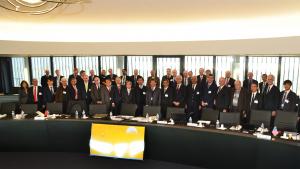Council takes important technical and managerial decisions
Seven years to the day after the signature of the ITER Agreement at the Elysée Palace in Paris on 21 November 2006, the ITER Council concluded its Thirteenth Meeting.
Braving an improbable episode of snowy weather, senior representatives from the seven ITER Members had gathered in the fifth-floor Council Chamber for two days (20-21 November) to discuss project progress under the chairmanship of Hideyuki Takatsu from Japan.
With the sixth full year of operation for the ITER Organization drawing to a close, it was reported that all major contracts for on-site civil works have been awarded. The manufacturing of key components is also progressing steadily within the ITER Member industries; in 2014 the first completed components will be shipped to the ITER site by the Members.
The Council responded to an internal, biennial independent assessment that urged changes in both project management and governance. The Council agreed with the assessment's findings, which indicated that the project faces challenges including schedule delays that need to be addressed immediately. To this effect, an action plan will be presented in mid-January and will be evaluated at an Extraordinary Meeting of the ITER Council in early February 2014.
Council also made two important technical decisions, approving ITER Organization proposals to commence operations with a full tungsten divertor and to include the in-vessel coils, which will improve plasma stability, in the ITER Baseline.
Taking advantage of the presence of delegates from all of the ITER Members, three Procurement Arrangements were signed during or just after the Council meeting: the third Complementary Diagnostics Procurement Arrangement for the Integration Engineering of Upper Port #9 with India; the Blanket Shield (50%) Procurement Arrangement with China; and the Blanket Shield (50%) Procurement Arrangement with Korea (see the article on the blanket shield in this issue).
The next regular meeting of the ITER Council is scheduled for 18-19 June 2014 in Saint Petersburg, Russia.


